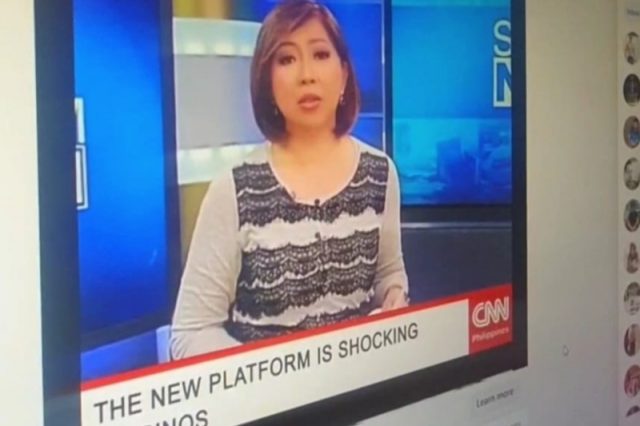A Filipino journalist spoke out against falling victim to Deep Fake technology, an AI-powered software creating manipulated videos.
On December 24, CNN Philippines reporter Ruth Cabal took to Facebook to inform the public that a manipulated video showing her newscast had been circulating online.
Cabal said that the video was taken from a previous newscast, evident by the presence of the CNN Philippines logo.
“This is what they warned us about, the perils of AI. Now having to deal with it myself. There’s a video of me reporting about an investment platform/program announced by a certain ‘Robin Padilla’ (yes, like the senator.),” she said.
“The video was taken from my newscast last week and bears the CNN Philippines logo. The voice also sounds a bit like mine but the pronunciation of some words is different,” the journalist also said.
Cabal shared a snapshot of the manipulated video alongside her post, highlighting her reporting on a purported “platform” for Filipinos.
She said that the clip is a “deep fake.”
“My video and audio were manipulated to report something else,” the veteran broadcaster said.
“This is DISINFORMATION. This was done with another one of our anchors last week too. Please report it to FB when you see it. Thanks,” Cabal said.
Her post has garnered 2,600 reactions and 1,700 shares on the platform.
Cabal’s post later surfaced on the X platform.
Several users also deemed it “creepy” and “scary” for perpetrators to create and spread these types of videos.
“This is so scary,” a Filipino user on X said.
“AI [artificial intelligence] should be heavily regulated this is so creepy,” an X user also said.
“The election will be a f***ing battleground. I’m scared of what’s to come,” a Pinoy on X reacted.
“AI will generate more fake news/misinformation in the future. Ang dali pa naman maniwala ng mga tao ngayon lalo sa Facebook,” an X user said.
What is ‘deep fake’
The Guardian, a British daily newspaper, defined “deep fake” as “a form of artificial intelligence called deep learning to make images of fake events, hence the name deep fake.”
“Want to put new words in a politician’s mouth, star in your favorite movie, or dance like a pro? Then it’s time to make a deepfake,” the report said.
According to the report, this video can also generate a fictional character by mapping out the faces of celebrities, government officials, reporters and other public figures.
In May last year, Microsoft President Brad Smith voiced concern regarding AI-driven technology, urging the need “address” the issues around it.
“We need to take steps to protect against the alteration of legitimate content with an intent to deceive or defraud people through the use of AI,” Smith said in his speech.
Some Filipino journalists recently criticized the use of AI-generated characters after GMA News unveiled its first AI-generated sportscasters.
They expressed their views that AI should be used as a tool for productivity and not for replacing people.
READ: Here’s why journalism groups worry about debut of GMA’s AI sportscasters | ‘AI could never’: Pinoys share broadcast bloopers as GMA debuts AI sportscasters










